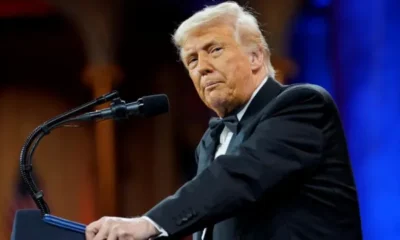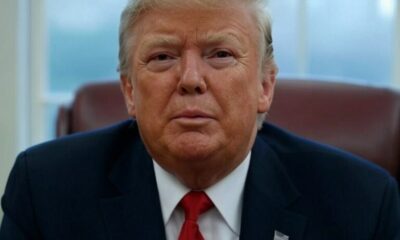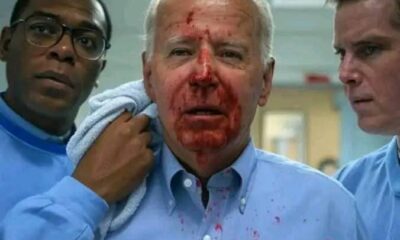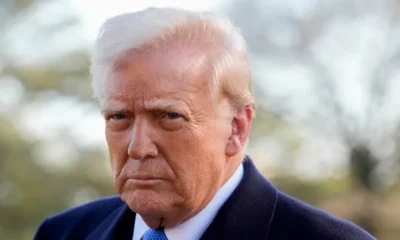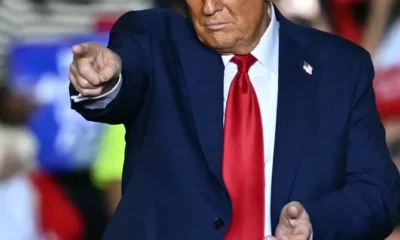NEWS
Latest news:Trump’s crackdown on university protests is casting a long shadow. Activists hope he’s also providing a spark Read more
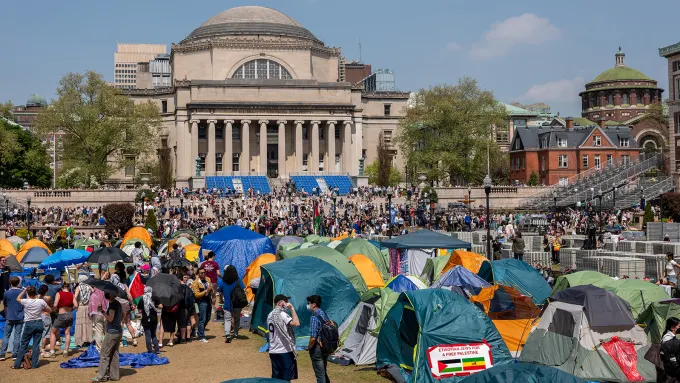
At Columbia University, which has long borne witness to protests and dissent, the atmosphere has shifted under a new regime of policy changes ostensibly aimed at heightening security, according to CNN interviews with more than a dozen students and faculty.
Students who spoke with CNN – most of whom requested to remain anonymous for fear of reprisals – described a tense mood on campus as the changes take hold.
The atmosphere is far from what Maria, a master’s student at Columbia whose name has been changed to protect her identity, imagined when she enrolled last spring.
“I put my money down for Columbia thinking that I would be going to a prestigious university known as a protest university, home of some of the largest human rights student movements in the country. But then two days later, the (pro-Palestinian protest) encampment started and NYPD came onto campus,” she told CNN.
The Manhattan campus has become the reluctant poster child for President Donald Trump’s actions aimed at higher education.
The administration has wielded its immigration authority to cancel the visas of hundreds of international students and visitors in the US and used the power of the purse to push for sweeping policy changes on campuses. Federal officials argue the moves are meant to combat antisemitism and bolster national security.
Universities – especially elite institutions – have for decades billed themselves as champions of free speech, and for many students and faculty, the stakes of the current controversy extend far beyond partisan politics – it’s about safeguarding the core values of free expression and the right to dissent. Many of those who spoke with CNN expressed optimism that a new wave of activism to protect those values may be building in response to the atmosphere of fear created by the president’s crackdown
Maria told CNN that, to her, the administration’s actions convey a clear message: “Dissent is not a viable form of social participation in our country.”
Columbia is not alone in coming under pressure. In just the past week, the Trump administration suspended $210 million in research grants to Princeton University and announced reviews of $510 million in funding for Brown University and $9 billion for Harvard University.
In recent months, the administration said it was investigating 10 schools for their handling of reports of antisemitism since 2023 and more than 50 for their Diversity, Equity and Inclusion (DEI) programs.
The Trump administration may have started by singling out Columbia, but we’re under no illusions that all universities – particularly elite universities – have targets on their backs,” said Kim Lane Scheppele, a professor of sociology and international affairs at Princeton.
The changes effectively ban protests inside and immediately outside academic buildings. Anyone who does protest is banned from wearing a mask or any face covering meant to conceal their identity. The university also hired three dozen new campus police officers specifically trained to deal with protests, and they have arrest powers. Student groups that violate the policies will be sanctioned, Columbia said.
“I’m staunchly aware of how militarized and surveilled our campus is now,” Maria said.
Other students who spoke with CNN said security officers can be seen around campus every day, which they say fosters a fearful and uncertain atmosphere on campus.
US
Trump’s crackdown on university protests is casting a long shadow. Activists hope he’s also providing a spark
By Hanna Park, CNN
9 minute read
Published 6:00 AM EDT, Sun April 6, 2025
Pro-Palestinian supporters continue to demonstrate with a protest encampment on the campus of Columbia University on April 29, 2024 in New York City.
Pro-Palestinian supporters continue to demonstrate with a protest encampment on the campus of Columbia University on April 29, 2024 in New York City. Spencer Platt/Getty Images
CNN
—
At Columbia University, which has long borne witness to protests and dissent, the atmosphere has shifted under a new regime of policy changes ostensibly aimed at heightening security, according to CNN interviews with more than a dozen students and faculty.
Students who spoke with CNN – most of whom requested to remain anonymous for fear of reprisals – described a tense mood on campus as the changes take hold.
The atmosphere is far from what Maria, a master’s student at Columbia whose name has been changed to protect her identity, imagined when she enrolled last spring.
“I put my money down for Columbia thinking that I would be going to a prestigious university known as a protest university, home of some of the largest human rights student movements in the country. But then two days later, the (pro-Palestinian protest) encampment started and NYPD came onto campus,” she told CNN.
Marlon Parris
RELATED ARTICLE
DHS said in 2016 it was not moving to deport a convicted Army vet. He’s spent most of Trump’s new term in ICE custody
The Manhattan campus has become the reluctant poster child for President Donald Trump’s actions aimed at higher education. The administration has wielded its immigration authority to cancel the visas of hundreds of international students and visitors in the US and used the power of the purse to push for sweeping policy changes on campuses. Federal officials argue the moves are meant to combat antisemitism and bolster national security.
Universities – especially elite institutions – have for decades billed themselves as champions of free speech, and for many students and faculty, the stakes of the current controversy extend far beyond partisan politics – it’s about safeguarding the core values of free expression and the right to dissent. Many of those who spoke with CNN expressed optimism that a new wave of activism to protect those values may be building in response to the atmosphere of fear created by the president’s crackdown.
Maria told CNN that, to her, the administration’s actions convey a clear message: “Dissent is not a viable form of social participation in our country.”
Columbia is not alone in coming under pressure. In just the past week, the Trump administration suspended $210 million in research grants to Princeton University and announced reviews of $510 million in funding for Brown University and $9 billion for Harvard University. In recent months, the administration said it was investigating 10 schools for their handling of reports of antisemitism since 2023 and more than 50 for their Diversity, Equity and Inclusion (DEI) programs.
“The Trump administration may have started by singling out Columbia, but we’re under no illusions that all universities – particularly elite universities – have targets on their backs,” said Kim Lane Scheppele, a professor of sociology and international affairs at Princeton.
NYPD officers guard during a protest outside Columbia University on March 24 in New York City.
NYPD officers guard during a protest outside Columbia University on March 24 in New York City. Kena Betancur/VIEWpress/Getty Images
‘A fortress with high walls’: The chilling effect on campus activism
Maria told CNN she no longer protests on campus. She said she’s afraid of repercussions, which to her seem more likely under the new security policies Columbia announced last month, after federal agencies canceled $400 million in research grants and contracts to the university.
The changes effectively ban protests inside and immediately outside academic buildings. Anyone who does protest is banned from wearing a mask or any face covering meant to conceal their identity. The university also hired three dozen new campus police officers specifically trained to deal with protests, and they have arrest powers. Student groups that violate the policies will be sanctioned, Columbia said.
“I’m staunchly aware of how militarized and surveilled our campus is now,” Maria said.
Other students who spoke with CNN said security officers can be seen around campus every day, which they say fosters a fearful and uncertain atmosphere on campus.
“Are they here to protect me or am I the suspect?” said one student, who didn’t want to give their name out of fear of retaliation. “Columbia is now a fortress with high walls. Some people are scared to even attend class.”
CNN reached out to Columbia for response to the students’ sentiments.
Allie Wong, a PhD student at Columbia, also described the atmosphere on campus as one of pervasive fear – one that’s especially palpable for her because she says she’s witnessed firsthand some of the consequences of the administration’s crackdown.
Last month Wong briefly went to Canada with a fellow Columbia PhD student who chose to leave the US after ICE agents repeatedly showed up at her door. Shortly after, Homeland Security Secretary Kristi Noem posted video of the pair at the airport, referring to the fellow student as “one of the Columbia University terrorist sympathizers.” (The student’s lawyer calls Noem’s statements “absolutely false.”)
That was a very scary experience for me,” Wong told CNN of being cast in the spotlight. A longtime advocate for international students through the Student Workers of Columbia, Wong said she was doxxed for being part of last April’s protests, something she worries about happening again, along with other legal repercussions.
While fear hangs over the campus for some, others – notably Jewish students – have found relief. David Jonah Lederer, who took part in counter-protests following the Oct. 7 Hamas attacks on Israel, said the policy reforms were long overdue.
US
Trump’s crackdown on university protests is casting a long shadow. Activists hope he’s also providing a spark
By Hanna Park, CNN
9 minute read
Published 6:00 AM EDT, Sun April 6, 2025
Pro-Palestinian supporters continue to demonstrate with a protest encampment on the campus of Columbia University on April 29, 2024 in New York City.
Pro-Palestinian supporters continue to demonstrate with a protest encampment on the campus of Columbia University on April 29, 2024 in New York City. Spencer Platt/Getty Images
CNN
—
At Columbia University, which has long borne witness to protests and dissent, the atmosphere has shifted under a new regime of policy changes ostensibly aimed at heightening security, according to CNN interviews with more than a dozen students and faculty.
Students who spoke with CNN – most of whom requested to remain anonymous for fear of reprisals – described a tense mood on campus as the changes take hold.
The atmosphere is far from what Maria, a master’s student at Columbia whose name has been changed to protect her identity, imagined when she enrolled last spring.
“I put my money down for Columbia thinking that I would be going to a prestigious university known as a protest university, home of some of the largest human rights student movements in the country. But then two days later, the (pro-Palestinian protest) encampment started and NYPD came onto campus,” she told CNN.
Marlon Parris
RELATED ARTICLE
DHS said in 2016 it was not moving to deport a convicted Army vet. He’s spent most of Trump’s new term in ICE custody
The Manhattan campus has become the reluctant poster child for President Donald Trump’s actions aimed at higher education. The administration has wielded its immigration authority to cancel the visas of hundreds of international students and visitors in the US and used the power of the purse to push for sweeping policy changes on campuses. Federal officials argue the moves are meant to combat antisemitism and bolster national security.
Universities – especially elite institutions – have for decades billed themselves as champions of free speech, and for many students and faculty, the stakes of the current controversy extend far beyond partisan politics – it’s about safeguarding the core values of free expression and the right to dissent. Many of those who spoke with CNN expressed optimism that a new wave of activism to protect those values may be building in response to the atmosphere of fear created by the president’s crackdown.
Maria told CNN that, to her, the administration’s actions convey a clear message: “Dissent is not a viable form of social participation in our country.”
Columbia is not alone in coming under pressure. In just the past week, the Trump administration suspended $210 million in research grants to Princeton University and announced reviews of $510 million in funding for Brown University and $9 billion for Harvard University. In recent months, the administration said it was investigating 10 schools for their handling of reports of antisemitism since 2023 and more than 50 for their Diversity, Equity and Inclusion (DEI) programs.
“The Trump administration may have started by singling out Columbia, but we’re under no illusions that all universities – particularly elite universities – have targets on their backs,” said Kim Lane Scheppele, a professor of sociology and international affairs at Princeton.
NYPD officers guard during a protest outside Columbia University on March 24 in New York City.
NYPD officers guard during a protest outside Columbia University on March 24 in New York City. Kena Betancur/VIEWpress/Getty Images
‘A fortress with high walls’: The chilling effect on campus activism
Maria told CNN she no longer protests on campus. She said she’s afraid of repercussions, which to her seem more likely under the new security policies Columbia announced last month, after federal agencies canceled $400 million in research grants and contracts to the university.
The changes effectively ban protests inside and immediately outside academic buildings. Anyone who does protest is banned from wearing a mask or any face covering meant to conceal their identity. The university also hired three dozen new campus police officers specifically trained to deal with protests, and they have arrest powers. Student groups that violate the policies will be sanctioned, Columbia said.
“I’m staunchly aware of how militarized and surveilled our campus is now,” Maria said.
Other students who spoke with CNN said security officers can be seen around campus every day, which they say fosters a fearful and uncertain atmosphere on campus.
“Are they here to protect me or am I the suspect?” said one student, who didn’t want to give their name out of fear of retaliation. “Columbia is now a fortress with high walls. Some people are scared to even attend class.”
CNN reached out to Columbia for response to the students’ sentiments.
Allie Wong, a PhD student at Columbia, also described the atmosphere on campus as one of pervasive fear – one that’s especially palpable for her because she says she’s witnessed firsthand some of the consequences of the administration’s crackdown.
Workers pass out flyers for a free “Do You Know Your Rights As An Immigrant” workshop at the food pantry run by La Colaborativa, serving the largely immigrant and working-class residents of Chelsea, Massachusetts, U.S., January 29, 2025. REUTERS/Brian Snyder
RELATED ARTICLE
What rights do immigrants have, and what do they not have?
Last month Wong briefly went to Canada with a fellow Columbia PhD student who chose to leave the US after ICE agents repeatedly showed up at her door. Shortly after, Homeland Security Secretary Kristi Noem posted video of the pair at the airport, referring to the fellow student as “one of the Columbia University terrorist sympathizers.” (The student’s lawyer calls Noem’s statements “absolutely false.”)
“That was a very scary experience for me,” Wong told CNN of being cast in the spotlight. A longtime advocate for international students through the Student Workers of Columbia, Wong said she was doxxed for being part of last April’s protests, something she worries about happening again, along with other legal repercussions.
While fear hangs over the campus for some, others – notably Jewish students – have found relief. David Jonah Lederer, who took part in counter-protests following the Oct. 7 Hamas attacks on Israel, said the policy reforms were long overdue.
“The reforms pushed by the Trump administration at Columbia are not new,” Lederer told CNN. “We have been pushing for a mask ban, public safety reform, discipline, time, place and manner protest regulations, viewpoint diversity and broader governance reforms for over a year.”
Still, critics argue that the measures set a troubling precedent that could stifle all forms of expression, regardless of the cause.
“Many of the people who might lose scholarship and research funding have expressed no opinion on Israel-Palestine. Many are doubtless Jewish, too. This tells us that combating anti-Semitism is merely a pretext for stifling free expression,” Michael Cooperson, a professor of Arabic at UCLA, told CNN over email.

